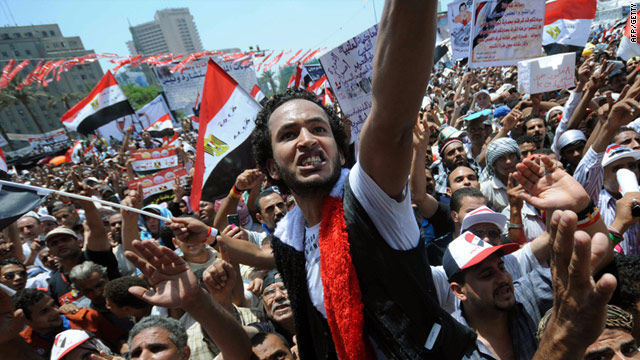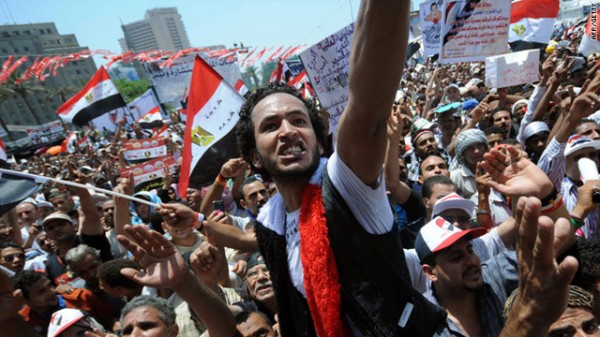

By: Erin Cunningham
Source: http://www.washingtonpost.com/
At a modest cafe in Cairo, 29-year-old Ali Mustafa and his friends had barely uttered a few sentences about how hopeless they feel under Egypt’s new political order when a group of older men sitting nearby scolded them angrily.
“We all want Sissi [to be president], and that’s it,” one gray-haired patron yelled at the young men, referring to Egypt’s popular presidential candidate, Abdel Fatah al-Sissi. Another man accused Mustafa and his friends of endangering the country’s stability with their views and threatened to call the police.
The recent confrontation, in the capital’s impoverished neighborhood of Imbaba, was a small reflection of a widening generational split over Egypt’s increasingly authoritarian trajectory — one that is likely to challenge Sissi should he be elected this spring.
The former military commander, 59, boasts strong support from many in Egypt’s older generation, who view his willingness to violently confront the Islamist opposition as a continuation of the security-led policies favored by Egyptian leaders since army officers seized power in 1952. But Sissi also faces a growing bloc of young people embittered by the repressive political climate as students and activists are imprisoned and the economy sputters.
More than half of Egyptians are younger than 25, and their ranks are growing faster than the rest of the population. The government, meanwhile, is dominated by aging political veterans: The youngest member of the cabinet is the youth minister, 55-year-old Khaled Abdel Aziz, and Prime Minister Ibrahim Mahlab, 65, is a holdover from the era of strongman Hosni Mubarak.
Rapid growth in the youth population is a common trend in developing countries, where older, seasoned politicians often call the shots. But analysts say the combination creates an especially high risk for political instability in Egypt, where security forces have cracked down fiercely on student protests and youth-led street demonstrations.
“There is definitely a big difference in the thinking of the younger and the older generations,” Mustafa said. “They want the military, and we don’t want anyone from the military to rule us ever again.”
For most of the past 60 years, Egypt was governed by military strongmen. The exception was the recent year-long tenure of elected President Mohamed Morsi, an Islamist backed by the Muslim Brotherhood. As defense minister, Sissi spearheaded the coup that removed Morsi from power last July.
“But what can we do?” Mustafa said. “If we try to change things, they will put us in jail.”
Deepening apathy
The rift between generations is certainly not absolute. A significant number of young people support Sissi and the current military-backed order, and some older people oppose the government and its security campaigns.
But when Egyptians voted in a referendum on the new, military-supported constitution in January, unofficial results from election monitors showed that less than a quarter of voters younger than 30 had cast ballots.
No figures are available on the percentage of young people who voted in 2012 on a previous constitution drafted by the Muslim Brotherhood. But according to Magued Osman, director of the independent Egyptian Center for Public Opinion Research, more young voters participated in that referendum.
The low turnout in January suggests a deepening apathy among Egypt’s youths, just three years after young people spearheaded the pro-democracy revolt against Mubarak.
For many of them, the stability the government promised with the new constitution is reminiscent of the Mubarak years, when young people languished under a corrupt police state or sought to emigrate for work in Europe or the Persian Gulf region.
Since 1950, Egypt’s population has quadrupled to 86 million, according to the United Nations. An unprecedented number of people are entering the job market at a time of sluggish economic growth. Those ages 15 to 24 are six times as likely to be unemployed than older workers, according to the International Labor Organization.
“Nothing has changed since [the 2011 revolt]. And the youth, they have lost hope,” said Ayman Zohry, a Cairo-based demographer.
“They were very naive,” he added. “They thought the revolution would make corruption disappear overnight, but the same power relations are in place. And now the older generation believes they are against stability and security — that they just want to protest and write graffiti on walls.”
A seat at the table
Indeed, with the help of Egyptian media, the government has portrayed youth activists such as Ahmed Maher — leader of the April 6 Youth Movement, which played a key role in the 2011 uprising — as foreign-paid saboteurs intent on leading Egypt into anarchy and chaos.
Secular, anti military groups such as Maher’s have kept the pressure on, leading demonstrations against the Supreme Council of the Armed Forces, which ruled from 2011 to 2012, and against Morsi’s administration after that. Since last year’s coup, they have held sporadic but waning street rallies. Some of their most prominent organizers are in prison, including Maher, who is serving a three-year sentence for attending an illegal protest.
Marches led by Morsi supporters and the Muslim Brotherhood are increasingly driven by young people as thousands of Brotherhood leaders have been jailed.
“They will oppose any person that comes to power,” Abdel Nabi Abdel Sattar, the spokesman for a pro-Sissi campaign group, said of the youth-led opposition.
“Their goal is to prevent stability,” Abdel Sattar said. Asked about his age, he joked about being old and would say only that he is in his 50s.
Abdel Sattar insisted that most of his campaign workers — who he said pushed for Sissi to run for president — are young. But he was unable to produce a single name or phone number of a youth volunteer.
Many youth leaders who oppose the regime — including some who allied with the military to topple Morsi — say they simply wanted a seat at the table after the Islamist leader’s ouster but were rebuffed.
“The older generation has stifled this country for 30 years or more,” said Mahmoud Omar, secretary general of the youth wing of the Islamist-leaning Strong Egypt Party. “The youth have paid the highest price for the revolution, in blood and in arbitrary arrests. We just wanted to be included in the cabinet and other government positions.”
Omar said he sees little use in engaging with the government.
Cairo resident Mohamed Fareed, 28, explained the sense of desperation. “Say a young man sees his friend or brother get killed by a policeman on the street. He knows he will not get justice” under this government, Fareed said. “So maybe he will decide to get justice his own way — by killing the policeman or somebody else, maybe in the future. This is how desperate we have become.”
“The problem is, the older generation wants us to shut up and accept the reality, because they think this is the best we’ll ever get,” Fareed said. “But we have to hope. There are more of us than there are of them.”
The views expressed in this article are the author’s and do not necessarily reflect those of MuslimVillage.com.



